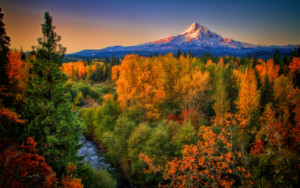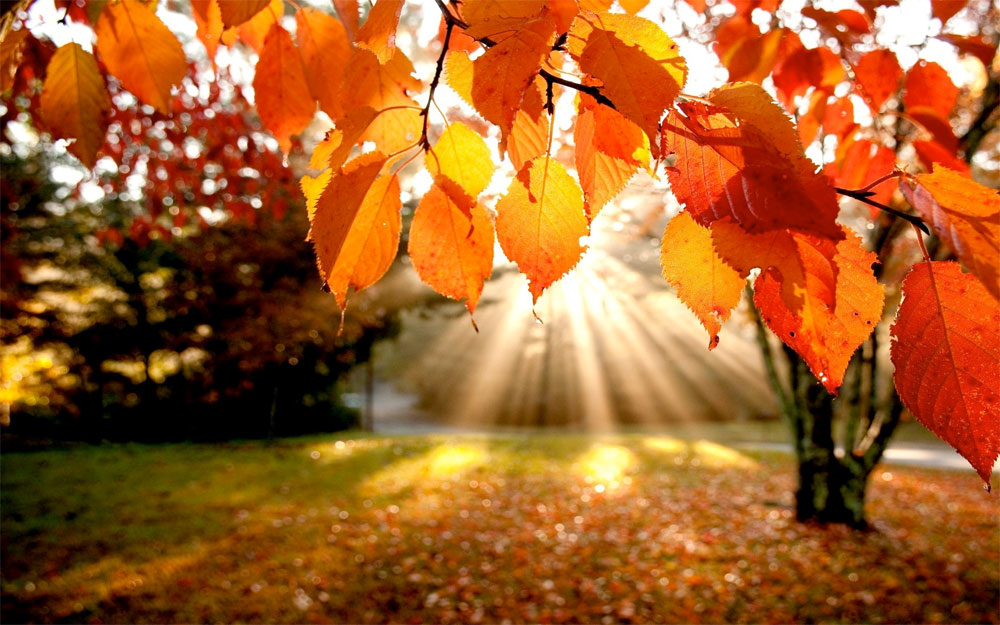October 2019 – I am updating my Fall Season Wellbeing post from last year. Its lessons stand the test of time. They also remind me to practice what I preach. But, there are a few updates required. Last year, I gave advice about “handling the November [midterm] election” noting that it was a “politically fraught time in the U.S.” and “it’s unclear what will happen” [!]. Well, the song remains the same this year. The situation perhaps even more fraught for our Republic in the Unites States. Another update: Like the rest of the world, we are learning to navigate a changing climate. Last year’s post also referenced the hot and dry summer of 2018 in the Pacific Northwest. This year, luckily, we were spared a smoky and dangerous wildfire season. And in Portland, the rains came early in September and we set records for cold temperatures! By now, a few weeks after the Autumn Equinox, it can seem like we have been in Fall season for a while. No better reason to get into a seasonal groove now, before Halloween and the holidays! – Dr. Thomas Doherty
Now is a good time to do a bit of a fall “tune-up.” You have probably experienced how time tends to speed up at the end of the year: Picture the last grains of sand running out of an hour glass or imagine the venturi effect when a river speeds up when going through a narrow mountain chasm. A little bit of planning and intentionality now at the balance point of the Fall Equinox can help you get ahead of the game so that when life starts to move quickly at the holidays, you won’t be swept up in the mad end-of-year rush. (And lose your health focus and sense of personal sustainability).
We’ve had a return to a cooler, wetter summer here in the climate changed Pacific Northwest. With humans affecting the planet, it’s easy to lose sight of larger natural cycles. But, with the arrival of fall, it’s useful to remember that the northern hemisphere naturally tips away from the sun at this time of year, as it has for eons, ushering in shorter days and cooler weather. Some of us like rain and enjoy this change, but for others the darkness of fall and winter can be an additional challenge piled on top of work, family and holiday demands.
The fall offers an opportunity to “reset” both your mind and your body, so that you don’t just dread and endure the weeks and months ahead, but actually thrive in them. Here are 10 ways to do that:
- Adjust your diet now. Over-indulging in holiday food and drink is pretty much a given for most of us at some point during the season. So, plan ahead. Reset your baseline diet before the holidays arrive. If you want to enjoy holiday treats without blowing your fitness and harming your health, then use the fall to sample a “whole foods” diet (i.e., taking a break from wheat, sugar, and alcohol or coffee). Or try brief fasts at the beginning of October, November & December to cleanse and lower your appetite. These intermittent fasts can help you avoid weight gain and keep you centered. In addition to healthy foods, add a vitamin D supplement now if you are not already.
- Plan for wet weather outdoor recreation activities. It’s important to keep your outdoor activities going even when the weather changes. There is an old saying “There’s no bad weather, only bad gear” (to which I would add “and poor timing.”). You don’t need fancy gear or expensive clothing to get outside in the fall. Serviceable outdoor gear that keeps you warm and dry plus decent boots will do just fine. And watch the weather so you can take advantage of nice days. Don’t go hiking, camping of skiing if the forecast is truly dreadful.
 Be with the land as the seasons change. Rather than retreating indoors, getting outside in the fall can be wonderful. Enjoy the cooler weather; appreciate the changing colors of the leaves on the trees; take a walk in an apple orchard. There are many places in the NW where the fall is “picture postcard” pretty (like the Hood River Valley).
Be with the land as the seasons change. Rather than retreating indoors, getting outside in the fall can be wonderful. Enjoy the cooler weather; appreciate the changing colors of the leaves on the trees; take a walk in an apple orchard. There are many places in the NW where the fall is “picture postcard” pretty (like the Hood River Valley).
- Note your emotional responses to the season. The fall can be a melancholy time because things are ending. Leaves drop, the harvest is in, and the earth is preparing to rest. It’s a good time for reflection on your life and for beginning to let go of the year. It’s important to remember that there’s a difference between feeling melancholy and being clinically depressed. Part of maintaining good mental hygiene for yourself is recognizing that sadness is one of many healthy emotions to express, and that it will pass. Just don’t dwell on sad things. By taking good care of yourself, melancholy feelings can deepen your experience of the season need not lead to depression. (See a note on Seasonal Depression below.)
- Celebrate your way. The calendar is full of upcoming seasonal celebrations. These can be wonderful, a chance to connect with others and refresh your spiritual side. Just remember that you are in control of what and how you celebrate. And also remember that beneath all those layers of holiday marketing, religion, and culture there is an Earth-based component to Fall and Winter celebrations. An outdoor walk, hike or camping in a beautiful place may fit the bill for you.
- Plan for less sunlight. The essence of winter is that our part of the planet receives less solar radiation. As mammals that really affects us. You might consider getting some light therapy, which usually involves using a special light source to replace some of those lost beams on a daily basis. I use a winter light for health and energy, and prefer a style that clips on the visor of a baseball cap that I can wear as I move about for the first 20 minutes after I get up on a dark morning. Even though I do not suffer from SAD (Seasonal Affective Disorder, a category of depression that emerges in particular seasons of the year), I find that light supplementation helps me to wake up and gives me more energy. Of course, you can try to get outdoors when the sun IS shining—every little bit helps keep the winter blues away.
 Humans Do Not Hibernate! Schedule vigorous exercise throughout winter. I want to dispel a myth: Humans do not hibernate. We did not evolve to hibernate and I know of no modern indigenous peoples that hibernate. So, while it may be well meaning, to say we are “hibernating” risks a danger of rationalizing a very modern seasonal sluggishness associated with lack of physical activity, artificial light, and being cooped up indoors. To prevent this seasonal slump, plan to counteract it by upping your activity level now. Research shows that inactivity can make your mood worse. It’s far better to undertake an exercise resolution in the fall season rather than in January. This way, you’ll go through holidays feeling good and you can start the new year off with momentum. And after working up a sweat outside, you can relax in a comfy chair and enjoy a bit of what the Danes call hygge.
Humans Do Not Hibernate! Schedule vigorous exercise throughout winter. I want to dispel a myth: Humans do not hibernate. We did not evolve to hibernate and I know of no modern indigenous peoples that hibernate. So, while it may be well meaning, to say we are “hibernating” risks a danger of rationalizing a very modern seasonal sluggishness associated with lack of physical activity, artificial light, and being cooped up indoors. To prevent this seasonal slump, plan to counteract it by upping your activity level now. Research shows that inactivity can make your mood worse. It’s far better to undertake an exercise resolution in the fall season rather than in January. This way, you’ll go through holidays feeling good and you can start the new year off with momentum. And after working up a sweat outside, you can relax in a comfy chair and enjoy a bit of what the Danes call hygge.
- Set boundaries regarding consumerism. As the holidays approach, the pressure to buy gifts, get the best “Black Friday” deal, or show off the coolest gadgets can be overwhelming. Fall is a good time to think about your values and be clear about your holiday budget. Jotting down a spending plan before Halloween can keep you from going overboard later. Remember that the best gifts reflect your thoughtfulness about the recipient – and those can be priceless.
- Be assertive with family and relatives about your time. The holidays can demand more of your time than you can realistically give. Be clear with friends and family about what you will and won’t do. Many people feel trapped by family obligations and holiday get-togethers. Remind yourself that your actions are voluntary and it is best to focus on what is healthy for you right now, not only on others’ expectations. The truth is, you don’t have to do anything over the holidays. If you adore being around your family and it makes you a better person, then huddle and cuddle with them for days on end. But, if family relations are stressful or challenging, make sure you set good limits on your time and maintain your own space and sense of control and comfort. And keep a flexible attitude. Try not fall into old family rivalries or a youthful need to rebel and assert yourself. If you are in a healthy spot, you can let others be “in charge” for a bit. Be thankful for the moments that you have.
- Have a plan for handling politics and social issues. When we look back at history, we find that there are always political crises to be found. It is challenge to choose the right path as a citizen even in the best of times. That said, there is particular uncertainty worldwide given the pressures of the climate crisis and unresolved issues like Brexit and the Hong Kong democracy protests. In the US, we remain at a politically fraught time with threats to democratic principles, a free and objective press, and Constitutional standards. There are real issues with voting rights, election security, gerrymandering, and disinformation. Tensions are running high and it’s unclear what will happen. It is a healthy ethical duty to be involved in local and national politics by striving to make your voice and vote heard, and through donating, going to meetings, and helping to get out the vote. But it’s also important to recognize the limits of your control and to hold tight to your values no matter the outcome. Our political impacts are made through our lives and not through one vote or one election. Tell yourself that no matter what happens in November, you will keep going, and keep living with integrity. You want to be healthy and moving forward for the rest of 2019. Have a plan for how you’ll do that that transcends politics.
You don’t need to do all ten of these fall tune up items. Pick and choose what works for you. But do try some of them—you may be pleasantly surprised at how much difference simple changes can make!
Start now.
And enjoy the season,
—Dr. Thomas Doherty

